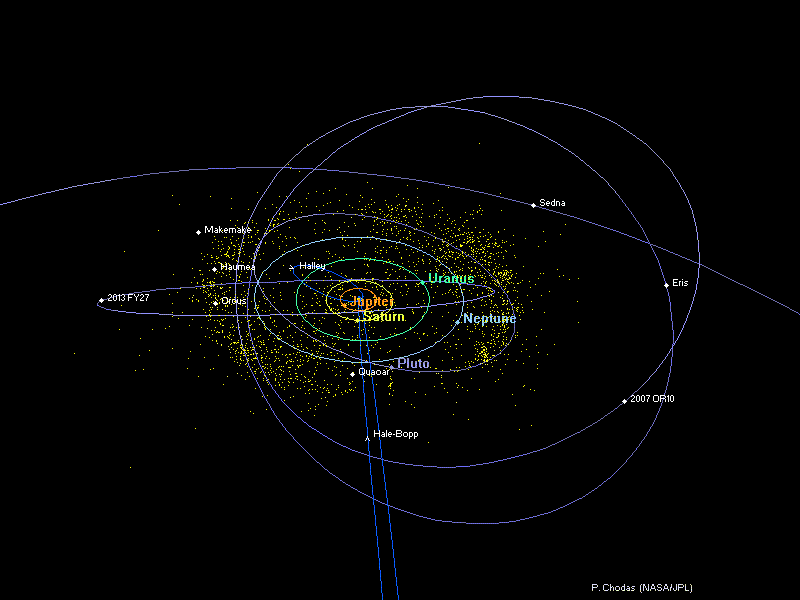First you seem too sensitive to suggestions that your hypothesis may be incorrect.
Second, it seems to me that you do not understand how this solar system evolved, according to the most widely held theories on that matter by most astronomers. Having a highly elliptical orbit is unusual and therefore unlikely. BUT Pluto can be a model for an anomaly; I already addressed that possibility. I provided one link further down.
Third, having a "rogue" or unusual planet in an unusual orbit or location has long been a hypothetical proposed by many with very little supporting evidence. I pointed out that your source (NASA) speaks of the highly speculative nature of the hypothesis that you are suggesting. The data is also speculative and merely a "suggestion."
So what did I not characterize properly? You asked a question, I answered; you then provided "evidence" that is at its best very speculative, and said so, and now you say I cannot read and comprehend? What did I miss that you stated?
Here is your statement, showing you do not fully understand the nature of astronomical discoveries:
The planet has to be very dark and have an atmosphere that reflects very little light to explain why it still hasn't been discovered.
It need not be "dark" as you say. Size AND distance both matter when you are looking for a an object that far from earth. The bigger it is, the closer it is to the earth, and the brighter it is, the more likely it will be seen and discovered. So it is a function several factors: 1) size, 2) amount of light reflected, 3) relative positions of both the earth and the theoretical Planet Nine, and 4) the ability of observer to discern a point of light being a planet versus a star. Since planets only reflect light and do not produce light, all these are key factors in it possible discovery. Upon further reflection by me, I would think that #3 is likely the largest factor. Again I addressed that already when I spoke of "luck" as a factor (#8) in its possible discovery. I would also conjecture that unless the planet is close to the earth that the atmosphere has only a small bearing on light reflected, but I will admit that such a comment by me is merely speculation since I am not an astronomer.
If this hypothetical Planet Nine is relatively close to the earth on its highly elliptical orbit, it will be more likely discovered soon, assuming also that enough resources and energy is devoted to that endeavor. I do not know off the top of my head the likely distance, but a 20,000 year orbit will take it a great distance from earth. I would speculate that it would be at least 200 AU from the earth at its apogee.
Also what significant event in the earth's history would be tied to a 20,000 year orbit of this proposed Planet Nine? I do not recall any such suggestion here by your assumption.
You misquoted me. I never said "that in my [your} eyes it has been discovered " Please go back and re-read what I wrote because you have mis-construed what I wrote.
Here is your quote:
why would that mean that in my eyes it has been discovered ?
Otherwise, I answered the question: It is possible and not plausible.
Again, this is from your source/URL/Link:
Caltech researchers have found mathematical evidence suggesting there may be a "Planet X" deep in the solar system. This hypothetical Neptune-sized planet orbits our Sun in a highly elongated orbit far beyond Pluto. The object, which the researchers have nicknamed "Planet Nine," could have a mass about 10 times that of Earth and orbit about 20 times farther from the Sun on average than Neptune. It may take between 10,000 and 20,000 Earth years to make one full orbit around the Sun.
Your original question, that I have already answered:
that would be an explanation to the known planets orbits all leaning the same way compared to the sun.... could it be?
I would say your speculation here is incorrect. I suggest the use Occam's razor.
As far as your angles that you asked about,
rotate around the sun over a 150° angle total... and nothing rotates in the other 210°
You do realize that nearly ALL the planets and asteroids rotate in the solar system in the same PLANE as the earth, meaning the angles are near ZERO, and NOT near 360° for a sphere or circle. So it seems to me that you do not understand planetary orbits. I already mentioned that Pluto is a bit out of alignment and that is about 20° or so, based on information I read many years ago, perhaps in one of my Astronomy classes from my undergraduate days. Pluto's orbit is slightly elongated too, but not the extent of the elongation that would or could be likely in a 20,000 year orbit. (Of course a perfectly circular orbit could also last 20,000 years, but I am referring back to the your NASA source and its speculative orbit.) And even though most planets have an elliptical orbit, as proven by Sir Isaac Newton, most are very nearly circular. Comets are the best example of bodies that orbit the sun in highly elliptical orbit. So for a planet to have a highly elliptical orbit is VERY unusual and very unlikely.
Try this URL:
https://www.windows2universe.org/?page=/our_solar_system/formation.htmlBUT the very last points here: a) I am not an expert and b) "Planet Nine" awaits more or any cogent evidence. c) No one really knows, hence it is possible. d) It is possible, but not plausible.
JP4Fun





























































































